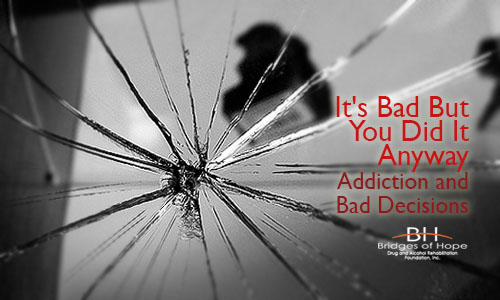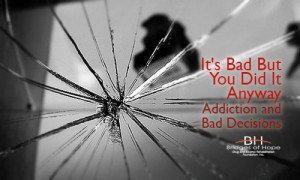The science behind our bad decisions
What makes us screw up? We know we’re going to do something wrong and we’re bound to get the nasty consequences of our bad decisions. But still, we went on and did things anyway. Why?
So you can’t stop ourselves from finishing off that third slice of chocolate cake. And at times, no matter how much you tell yourself to forget your ex and move on, you suddenly find yourself caving in and sending a text you wish you could take back.
These are just minor mishaps. However, there are times when you screw up big time.
Like when you tell yourself you’re not going to use shabu (meth) anymore. You’re down to your last peso, you lost your job, you sold your TV, but you went to your dealer anyway.
There’s no denying that drugs such as meth affect our decision-making. Addiction hijacks out minds, causing us to make bad decisions. But you know, even if you’re sober, you still screw up too.
So what is it that makes us make bad decisions?
In an article by Dr. Ellen Hendriksen published in Psychology Today, she explains what’s behind making bad decisions, even if you actually know what’s the better alternative.
Liking and Wanting
Psychologically speaking, there are two kinds of pleasure to which our brain responds to: liking and wanting.
Liking is a state of happiness, satisfaction, contentment. This is based on your preferences, where your brain releases dopamine when you experience certain things. Usually, this happens after you have a good meal, a slice of that favorite dessert, being with friends or family. These are called natural rewards.
Wanting, on the other hand, can be felt when you pursue something. There’s this feeling of seduction, anticipation, and excitement, among others. It’s similar to lust, desire, or the thrill of the chase–wanting something you don’t have.
This wanting is what makes you fixate on things. It drives you to do things what you will later on regret, even if you know something wrong is going to come out of it.
Addiction and “Wanting”
Since substance abuse hijacks our brain’s reward system with large, unnatural amounts of dopamine, the brain eventually loses its ability to feel pleasure from natural rewards such as good food and warm hugs.
You may have started using drugs casually because you like how it makes you feel good. But eventually, in combination with your genetic predisposition and experiences, your drug use has become a compulsion, leading to addiction.
As a result the desire for the insane amounts of dopamine surges in the brain changes the reward system to want more and more of the substance. And if the brain doesn’t get it, it craves and seeks it repeatedly, often uncontrollably, even if it would cost you so many things such as your friends, family, and health. The same thing can be said for alcohol and behavioral addictions.
But here’s the good news
The bad choices that you’ve made do not define who you are. So go easy on yourself.
You’re not scot-free and would still have to be accountable for your actions, though. You still have to make amends and do right by the people you’ve wronged. Being aware of your mistakes gives you the power to create a better life in your recovery.
Do you have a family or loved one who have wronged you because of their addiction problems? Or maybe it’s you who have committed mistakes because of your addiction? It’s not too late to change now. Call or text us at 09175098826. We’re here to help.



Recent Comments